Odysseus
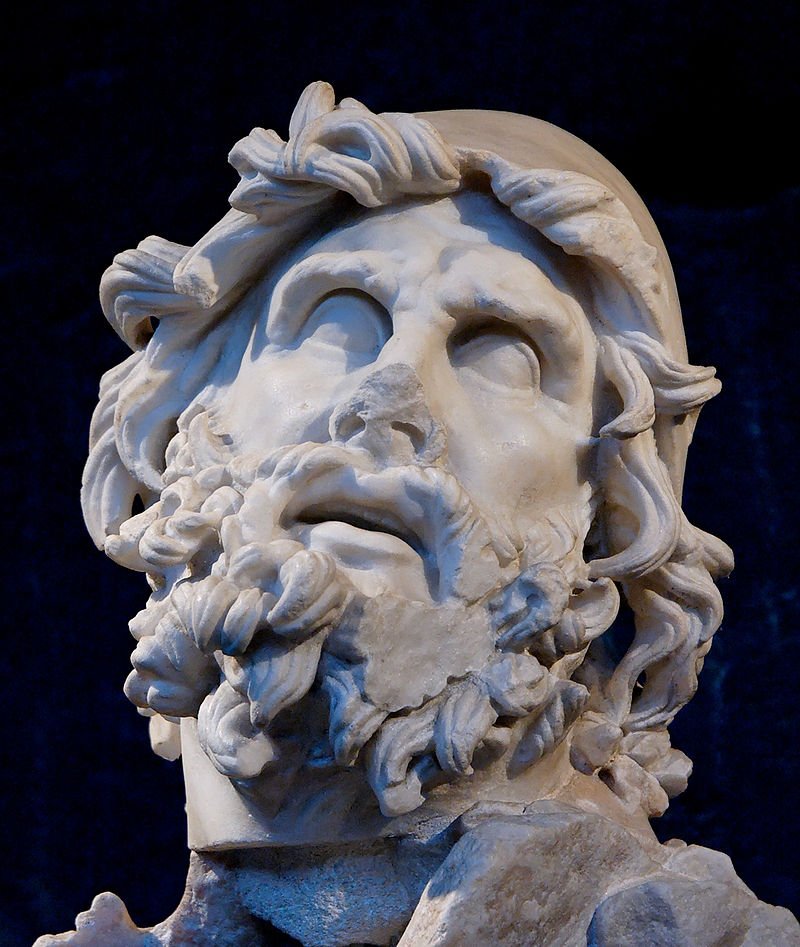
Odysseus is the main hero in Homer’s epic poem, the Odyssey and plays a key role in Homer’s Iliad. He is renowned for his guile and resourcefulness, and is most famous for the ten years it took him to return home after the Trojan War. He was the king of Ithaca, husband of Penelope, father of Telemachus, and son of Laertes and Anticlea. Sisyphus is mentioned is his grandfather.
For a character of such prominence in the Iliad, one of Agamemnon’s principal lieutenants, Odysseus’ pedigree is relatively obscure. Laertes’ father (or stepfather) is Arcesius, a son of Cephalus (eponymous founder of Cephallenia), and grandson of Aeolus. Ithaca was one of several islands that formed Odysseus’ kingdom, along the Ionian coastline of Ancient Greece. Odysseus’ realm also appears to have included a small foothold in Epirus, near the mouth of the river Achelous.
Before the Trojan War
Odysseus claimed to be one of the suitors for Helen, daughter of Tyndareus. Helen was described as the most beautiful woman in the world and many a king asked for her hand. He saved time and money speaking to all the leaders. Tyndareus, afraid of offending the many famous and powerful suitors, could not choose among them. Odysseus promised to solve the dilemma, in return for Tyndareus’ support for Odysseus suit for Penelope, daughter of Icarius, Helen’s cousin. Odysseus proposed that Tyndareus require all the suitors to swear an oath to defend whomever Helen chose as husband from among the oath-takers. The suitors, including Odysseus, swore and Helen chose Menelaus, the most powerful of them.
When Helen was abducted by Paris of Troy, the suitors were called upon to honour their oaths and help Menelaus retrieve Helen, which led to the Trojan War. Because an oracle had prophesied he would not return for a long time, Odysseus didn’t want to go to war; he pretended to be insane, ploughing his fields and sowing salt instead of seeds. Agamemnon, Menelaus’ brother, sent Palamedes to convince Odysseus to join the expedition. Palamedes was very intelligent, and placed Telemachus, Odysseus’ infant son, in front of the plough. Odysseus could not kill his son, thus revealing his sanity, and then left for the Trojan War. Odysseus held a grudge against Palamedes during the war for dragging him away from his home.
With Odysseus now part of oathtakers army, Agamemnon now set his goals on enlisting Achilles (who was not a suitor for Helen), because it was foretold that Troy could not be taken without him. Odysseus was one of the ambassadors that went to Scyros to fetch him. Achilles was disguised as a woman by his mother Thetis, so he would not be sent off to war. An oracle had predicted he would either live a long but uneventful life or die young but achieve everlasting glory, and she was fearful of the consequence if he went off with the expedition to Troy. So Odysseus asked if he could make presents to the women of the court. He laid out some jewels and also a sword, spear, and shield. All but one of the girls were interested in the jewelry; Odysseus had a war trumpet sound, which caused Achilles to instinctively grab the weapons brought by Odysseus. Thus was Odysseus able to identify Achilles. Odysseus told Achilles‘ mother, Thetis, to send for Peleus‘ Myrmidon arms and armor made by the god Hephaestus to protect him at Troy. Odysseus let Achilles keep the sword, spear, and shield.
Odysseus who planned the scheme of bringing Iphigenia, daughter of Agamemnon, to be sacrificed under the pretext of marrying Achilles when the crew was without wind. This was because of a prophecy, due to an omen from Zeus that the human sacrifice would be the only way to appease Artemis to cause favorable winds. After the sacrifice the crew was able to set sail for Troy.
On the way to Troy, the eponymous warrior Philoctetes was bitten by a snake on Chryse. Agamemnon advised that he be left behind because the wound was festering, smelled bad, and recovery seemed unlikely. However, Philoctetes’ bow was needed for the war effort, and so Odysseus was sent to retrieve him.
Before the actual war started, Odysseus accompanied Menelaus and Palamedes in an envoy to try to bring back Helen peacefully. While Menelaus’ arguments to retrieve Helen were emotional and unpersuasive, Odysseus’ arguments very nearly persuaded the court and elders to give back Helen, but ultimately failed. After the discussion with Priam’s court, the Trojans insulted and disrespected Menelaus and Odysseus except for Antenor who treated the Greeks with hospitality; because of this hospitality, Antenor was spared during the destruction of Troy.
During the Trojan War
Odysseus was one of the main Achaean characters in the Trojan War. The others were “godlike” Achilles, Agamemnon “lord of men”, Menelaus, Nestor, Telamonian Ajax and Ajax the Lesser, Diomedes and Teucer the master archer.
When the Achaean ships reached the shores of Troy, no one would jump ashore, since there was an oracle that the first Achaean to jump on Trojan soil would die. Odysseus tossed his shield on the shore and jumped on his shield. He was followed by Protesilaus, who jumped on Trojan soil and later became the first to die.
Odysseus never forgave Palamedes for unmasking his madness ruse, leading him to frame Palamedes as a traitor. At one point, Odysseus convinced a Trojan captive to write a letter that looked as if it was sent by Palamedes, in which a sum of gold was mentioned to have been sent as a reward for Palamedes’ treachery. Odysseus then killed the prisoner and hid the gold in Palamedes tent. He caused the letter to be found and received by Agamemnon and also gave hints as to direct the Argives to the gold. This was evidence enough for the Greeks and they had Palamedes stoned to death.
Odysseus was one of the most influential Greek champions during the Trojan War. Along with Nestor and Idomeneus he was one of the most trusted advisers and counsellors. He always championed the Achaean cause and was unwavering in his cause to continue on with the war and always supportive of Agamemnon when the king was in question, such as the time Thersites spoke against him. When Agamemnon (to test the morale of the Achaeans) announced his intention to depart Troy, Odysseus restored order to the Greek camp. Later on in the Iliad, after many of the heroes had left the battlefield due to injuries (including Odysseus and Agamemnon), Odysseus once again persuaded Agamemnon not to withdraw. Odysseus, along with two other envoys, was chosen in the failed embassy to try to persuade Achilles to return to combat.
When Hector proposed a single combat duel, Odysseus was one of the Danaans who volunteered to battle him (Telamonian Ajax was the volunteer who did fight Hector, though). Odysseus aided Diomedes during the successful night operations in order to kill Rhesus, because it had been foretold that if his horses drank from the Scamander river Troy could not be taken.
After Patroclus had been slain, it was Odysseus who counselled Achilles to let the Achaean men eat and rest, for Achilles, driven by rage, wanted to go back on the offensive – and kill Trojans – immediately. Eventually, Achilles reluctantly consents. During the Funeral Games for Patroclus, Odysseus becomes involved in a wrestling match with Telamonian Ajax, as well as a foot race. With the help of Athena, who favors him, and despite Apollo helping another of the competitors, he wins the race and manages to draw the wrestling match, to the surprise of all.
When Achilles was slain in battle, it was Odysseus and Telamonian Ajax who successfully retrieved the fallen warriors’ body and armour in the thick of heavy fighting. During the funeral games for Achilles, once again Odysseus competed with Telamonian Ajax in funeral games. Thetis said that the arms of Achilles would go to the bravest of the Greeks, only these two warriors dared to lay claim to that title. The two Argives then got in a heavy dispute about each other’s merits to receive the reward. The Greeks feared to decide a winner, for they did not want one of the heroes insulted and abandoning the war effort, so Nestor suggested that they allow the captive Trojans decide the winner. Odysseus was the winner and Ajax was defeated. Enraged and humiliated, Ajax killed himself by the sword Hector had given him after being driven mad by Athena to protect Odysseus from his vengeance.
Together with Diomedes, Odysseus went to fetch Achilles‘ son, Pyrrhus, to come to the aid of the Achaeans, because an oracle stated that Troy could not be taken without him. Pyrrhus was a great warrior and was named Neoptolemus. Upon the success of the mission Odysseus gave Neoptolemus the armaments of his father.
Later on, it was learned that the war could not be won without the poison arrows of Heracles, which were owned by the abandoned Philoctetes. Odysseus and Diomedes. In any event, upon their arrival Philoctetes (still suffering from the wound) was still very angry with the Danaans, especially Odysseus, for abandoning him. While his first instinct was to shoot Odysseus when they arrived to retrieve him, Philoctetes anger was eventually diffused due to Odysseus’ persuasive powers and the influence of the gods. Odysseus returned with Philoctetes and his arrows to the Argive camp.
Later on in the war, Odysseus captured Priam’s son Helenus the prophet. Helenus told the Greeks that Troy could not be taken without the capture of the Palladium, located in the city of Troy. Once again Odysseus and Diomedes went on a mission together to fulfill a prophecy. Diomedes crawled on Odysseus’ shoulders to enter the city and would not let Odysseus up and into the city. When Diomedes returned from stealing the Palladium and met back up with Odysseus, who was infuriated at Diomedes for not letting him up, he thought to kill Diomedes and take credit for himself and stepped behind Diomedes in order to stab him with his sword. Diomedes caught the glint of the sword in the moonlight and spun around and disarmed the Ithacan king, and proceeded to drive Odysseus back to the Argive camp with the flat of his sword.
Odysseus in the guise of a beggar covered in rags and blood entered the Trojan city secretly and alone. He was recognized by no one except for Helen and Hecuba, questioned by them, and allowed to return to the Greek camp unharmed.
The Trojan Horse, the famous stratagem, was devised by Odysseus. It was built by Epeius and filled with Greek warriors led by Odysseus. Before hand, Odysseus made Menelaus to give him whatever he asked after they had taken Troy. Menelaus agreed. When the Horse was brought inside Troy, Odysseus and Menelaus descended from it and went directly to Prince Deiphobos’ house, where they engaged in a most ferocious battle. Ultimately, Deiphobos, who was then the leading son of Priam and Helen’s third husband, was killed. Menelaus was also about to kill Helen for leaving him but Odysseus took advantage of the promise earlier and made Menelaus swear not to kill her. Then Menelaus got Helen back. For his crimes, including slaying the Theban warriors in their sleep, Odysseus was compelled by the gods to endure 10 years of hardship before he achieved a nostos, a homecoming. However, other Greeks committed great evils in Troy, such as the execution of King Priam. The most significant crime was the rape of Cassandra, carried out by Ajax the Lesser. This angered Apollo, as Cassandra was a priestess of the god. It was Odysseus who advised the Greeks to stone Ajax to death for his crime. However, the Greeks declined the life-saving advice. Apollo was intensely infuriated, and as a result he sent a storm that destroyed much of the returning Greek fleet.
Odysseus who convinced the other Argives to kill Hector’ young son, so he has no chance to avenge his city.
Journey home to Ithaca
The Ciconians
After Odysseus and his men depart from Troy, they are greeted by friendly and calm waters. The ships near land and Eurylochus, convincing Odysseus that the gods were on their side, told him to go ashore and loot the nearby city. The crew had landed in Ismara. The city was not at all protected, and all of the inhabitants fled without a fight into the nearby mountains. Odysseus and his men looted the city and robbed it of all its goods. Odysseus wisely told the men to board the ships quickly, but they refused, ate dinner and fell asleep on the beach. The next morning, the Ciconians (also known as the Cicones), allies of Troy and great warriors, returned with their fierce kinsmen from the mountains. Odysseus and his men fled to the ships as fast as they could, but “six benches were left empty in every ship”. Odysseus, however, had spared Maron, a priest of Apollo, who gives him twelve jars of wine which would be later used against the cyclops.
The Lotus-Eaters
When Odysseus and his men landed on the island of the Lotus-Eaters, Odysseus sent out a scouting party of three or so men who ate the lotus fruit with the natives. This caused them to fall asleep and stop caring about ever going home. Odysseus went after the scouting party, dragged them back to the ship against their will and set sail, with the drugged soldiers tied to the rudder benches
Polyphemus
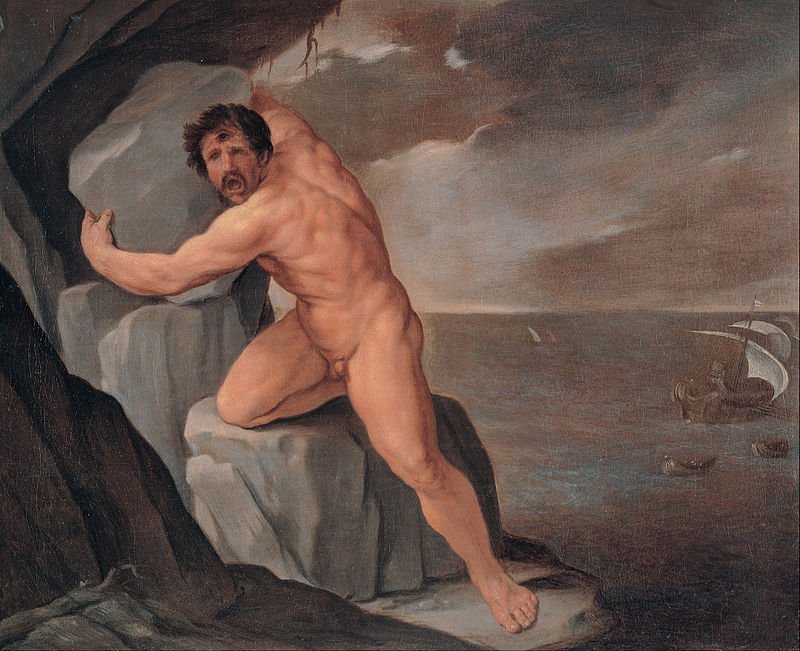
A scouting party led by Odysseus ( his friend, Misenus), lands in the territory of the Cyclops and ventures upon a large cave. They enter the cave and proceed to feast on food they find there. Unknown to them, the cave is the dwelling of Polyphemus, a one-eyed giant who soon returns. Polyphemus refuses hospitality to his uninvited guests and traps them in the cave by blocking the entrance with a boulder that could not be moved by mortal men. He then proceeds to eat a pair of the men each day, but Odysseus devises a cunning plan for escape.
To make Polyphemus unwary, Odysseus gives him a bowl of strong, unwatered wine. When Polyphemus asks for his name, Odysseus tells him that it is “Nobody”. In appreciation for the wine, Polyphemus offers to return the favour by eating him last. Once the giant falls asleep, Odysseus and his men turn a pine into a giant spear, which they had previously prepared while Polyphemus was out of the cave shepherding his flocks, and blind Polyphemus. Hearing Polyphemus’ cries, other Cyclopes come to his cave and ask what is wrong, what man has put out his eye? Polyphemus replies that “No-man is killing me”. The other Cyclopes leave him alone, thinking that his outbursts must be madness or the gods’ doing.
In the morning, Polyphemus rolls back the boulder to let the sheep out to graze. Now blind, Polyphemus cannot see the men, but feels the tops of his sheep to make sure the men are not riding them. Odysseus and his men escape, having tied themselves to the undersides of three sheep. Once Odysseus and his men are out, they load the sheep on board their ship and set sail.
As Odysseus and his men are sailing away, he reveals his true identity to Polyphemus in an act of hubris. Enraged, Polyphemus tries to hit the ship with boulders, but because he is blind, he misses (although the rocks get close to the ship). When the ship appears to be getting away at last, Polyphemus raises his arms to his father, Poseidon, and asks him to not allow Odysseus to go back home to Ithaca, and if he does, he must arrive back alone, his crew dead and in a stranger’s ship.
Aeolus
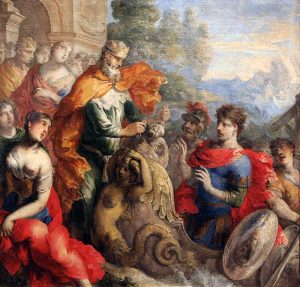
Odysseus stopped at Aiolia, home of Aeolus, the favoured mortal of the gods who received the power of controlling the winds. Aeolus gave Odysseus and his crew hospitality for a month in return for Odysseus telling interesting stories. Aeolus also provided a bag filled with the all the winds but the one to lead him home. Odysseus’ crew members suspected that treasure was in the bag (due to Odysseus guarding the bag for the entire voyage home without a wink of sleep). A couple of the men decided to open it as soon as Odysseus fell asleep – just before their home was reached. They were blown by a violent storm back to Aiolia by Poseidon, where Aeolus refused to provide any more help because he thought Odysseus was cursed by the gods. Odysseus had to start his journey from Aiolia to Ithaca over again; he was heartbroken, but hid his feelings from his crew.
The Laestrygonians
They came to Telepylos, the stronghold of Lamos, king of the Laestrygonians. Odysseus’s ships entered a harbor surrounded by steep cliffs, with a single entrance between two headlands. The captains took their ships inside and made them fast close to one another, where it was dead calm. Odysseus kept his own ship outside the harbour, moored to a rock. He climbed a high rock to reconnoiter, but could see nothing but some smoke rising from the ground. He sent two of his company with an attendant to investigate the inhabitants.
The men followed a road and eventually met a young woman, who said she was a daughter of Antiphates, the king, and directed them to his house. However when they got there they found a gigantic woman, the wife of Antiphates who promptly called her husband, who immediately left the assembly of the people and upon arrival snatched up one of the men and started to eat him. The other two men ran away, but Antiphates raised a hue-and-cry, so that they were pursued by thousands of Laestrygonians, giants, not men. They threw vast rocks from the cliffs, smashing the ships, and speared the men like fish.
Odysseus made his escape with his single ship due to the fact that it was not trapped in the harbor; the rest of his company was lost. The surviving crew went next to the island of Circe.
Circe

The next stop was the island of Circe (Aeaea), where Odysseus sent a scouting party ahead of the rest of the group. She invited the scouting party to a feast, the food laced with one of her magical potions, and she then changed all the men into pigs with a wand after they gorged themselves on it. Only Eurylochus, suspecting treachery from the outset, escaped to warn Odysseus and the others who had stayed behind at the ships. Odysseus set out to rescue his men, but was intercepted and told by Hermes to procure some of the herb moly to protect him from the same fate. When her magic failed she fell in love with Odysseus. He was able to convince her to return his men to human form by making her swear the Oath of the Immortals. Odysseus and his men were treated well in her abode. Quite reluctantly, but with the urging of his crew, Odysseus parted with Circe but not before she could give him advice for the quest home.
Sortly after leaving the Island Elpenor, the youngest of Odysseus’ crew, went up the mast to scout ahead, meanwhile a very powerful west wind blew him off the mast and he died on the ship’s deck. The crew regarded this as very suspicious since, when Elpenor fell a white bird flew up and guided them to the world of the dead. They believed that Athena killed Elpenor so that his soul would guide them.
Journey to the Underworld
Odysseus wanted to talk with Tiresias, so he and his men journeyed to the River Acheron in Hades, where they performed sacrifices which allowed them to speak to the dead, including his mother, Elpenor, Tiresias, Ajax, and Achilles. They all gave him valuable advice on how to pass the rest of his journey, while Ajax told him that they were making Penelope choose another husband and keeping his son captive in his own palace. Elpenor askes Odysseus to go back to the island of Circe and give his body a proper burial. Odysseus sacrificed a ram and the dead spirits were attracted to the blood. He held them at bay and demanded to speak with Tiresias, who told him how to pass by Helios’ cattle and the whirlpool Charybdis. (During the Trojan War Odysseus met a Trojan boy captured by Achilles, who was later freed to Troy, named Helios. He didn’t remember the name until he heard how to get by Helios, the god.)
Tiresias tells Odysseus that after he returns to Ithaca, he must take a well-made oar and walk inland with it to parts where no one mixes sea salt with their food, until someone asks him why he carries a winnowing fan. At that place, he was to fix the oar in the ground and make a sacrifice to appease Poseidon. He also told Odysseus that, after all that was done, that he would die an old man, “full of years and peace of mind”, that his death would come from the sea and that his life would ebb away very gently. He later meets Achilles, who tells Odysseus that he would rather be a slave on earth than the king of the dead. Then, Odysseus goes to Circe’s island to bury his comrade, Elpenor.
The Sirens
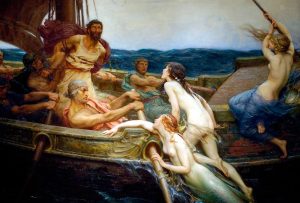
Circe warned Odysseus of the dangers of these singing creatures who pulled men to their death. She advised him to avoid hearing the song but that if he really felt he had to hear then he should be tied to the mast. His men should have their ears stopped with wax and be ordered not to heed his screams. Odysseus, moved by curiosity, twisted the words and told the men that Circe had told him that he had to listen to the song. He obeyed her instructions and listened to the song while he was tied to the mast.
Scylla and Charybdis
Odysseus was told by Teiresias that he would have a choice of two paths home. One was the Symplegades, where either all make it through or all die and which has been passed only by Jason with the help of Zeus, but he chooses the second path. On one side was a whirlpool, called Charybdis, which would sink the ship. However, on the other side of the strait was a monster called Scylla, daughter of Crataeis with six heads who would seize and eat six men.
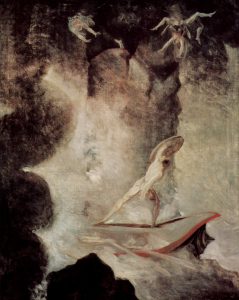
The advice was to sail close to Scylla and lose six men but not to fight, lest he lose more men. However, he did not dare tell his crew of the sacrifice, or they would have cowered below and not rowed and everyone would have ended up in Charybdis. Six men died, and Odysseus announced that the desperate cries of the wretched betrayed men were the worst thing he had ever known. Undoubtedly, this affected morale and left the survivors feeling mutinous.
Helios’ Cattle
Finally, Odysseus and his surviving crew approached an island, Thrinacia, sacred to Helios, where he kept sacred cattle. Odysseus had been warned by Tiresias and Circe not to touch these cattle. Odysseus told his men that they would not be landing on the island. Eurylochus then threatened mutiny and Odysseus unwisely gave in. The men were trapped by adverse winds on the island and began to get hungry. Odysseus went inland to pray for help and fell asleep. In his absence Eurylochus incited the men to kill and eat the cattle. The guardians of the island, Helios’ daughters, Lampetia and Phaethusa, told their father. Helios complained to Zeus and said that he would take the sun down to Hades if justice was not done. Zeus destroyed the ship with a thunderbolt and all the men died except for Odysseus. Odysseus was swept past Scylla and Charybdis whom he luckily escaped and was washed up on Calypso’s island.
Calypso and the Phaecians
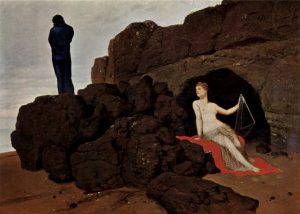
Odysseus was washed ashore on Ogygia, where the nymph Calypso, daughter of Atlas lived. She made him her lover for seven years and would not let him leave, promising him immortality if he stayed. As a result, Odysseus was strongly attracted to her by night yet wept by the shore for his home and family by day. On behalf of Athena, Zeus intervened and sent Hermes to tell Calypso to let Odysseus go. Odysseus left on a small raft furnished with provisions of water, wine and food by Calypso, only to be hit by a storm launched by his old enemy Poseidon and washed up on the island of Scheria and found by Nausicaa, daughter of King Alcinous and Queen Arete of the Phaeacians, who entertained him well and escorted him to Ithaca. While upon Scheria, the bard sings a song of the Trojan war. As Odysseus was at Troy and longed to return to his home, he wept at the song. Alcinous, realizing this decided to press Odysseus for his true identity.
It is here that we get the actual story of Odysseus’ trip from Troy to Scheria taking up books nine to twelve of the epic. After the recital, the Phaecians offer Odysseus passage home, with all of the hoardings he obtained on the way and the gifts the Phaecians themselves had bestowed upon him (showing xenia, the idea of guest friendship). King Alcinous provided one fast Phæacian, ship that soon carried Odysseus home to Ithaca. However, Poseidon, upon seeing Odysseus return home, was furious and intended to cast a ring of mountains around Scheria so they could never sail again. This naturally would have been damaging to the Phaecians, as they were seafarers. Zeus, however, managed to persuade Poseidon not to do this. Instead, he turned the ship which carried Odysseus home to rock. From that day on the Phaecians resolved to be less trusting of guests.
Odysseus reaches Ithaca
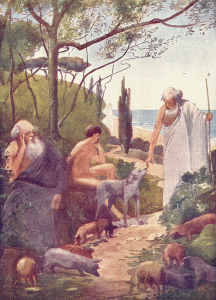
In Ithaca, Penelope was having difficulties. Her husband had been gone for twenty years, and she did not know for sure whether he was alive or dead. She was beset with numerous men who thought that a (fairly) young widow and queen of a small but tidy kingdom was a great prize: they pestered her to declare Odysseus dead and choose a new husband from among them. Meanwhile, these suitors hung around the palace, ate her food, drank her wine, and had sex with her servants. Penelope was despondent by her husband’s long absence and especially the mystery about his fate. He could come home at any time or never. Temporizing, she fended them off for years, using stalling tactics that were wearing thin. Meanwhile, Odysseus’ mother, Anticlea, had died of grief; and his father, Laertes, was nearly so.
Odysseus arrived alone. Upon landing, he was disguised as an old man or a beggar by Athena; he took the name Eperitus. Odysseus was welcomed by his old swineherd, Eumaeus, who did not recognize him in disguise but still treated him well. Odysseus’ faithful dog Argos was the first to recognize him in his rags. He had waited twenty years to see his master. Aged and decrepit, he did his best to wag his tail, but Odysseus did not want to be found out, and had to maintain his cover, so the disconsolate dog died. The first person to recognize him was his old wet nurse, Euryclea, who knew him well enough to see through the rags, recognizing him by an old scar; his son Telemachus didn’t see through the disguise, but Odysseus revealed his identity to him.
Odysseus learned that Penelope had remained faithful to him. She pretended to weave a burial shroud for Odysseus’ father, Laertes, and claimed she would choose one suitor when she finished. Every day she wove a length of shroud, and every night she unwove the same length of shroud, until one day, a maid of hers betrayed this secret to the suitors; and they demanded that she finally choose one of them to be her new husband. This occurred just before Odysseus’ return, who was then able to watch the suitors drink and take advantage of his family’s hospitality.
Still in his disguise, Odysseus went to Penelope and told her that he had met Odysseus and that he had said that whoever could string Odysseus’ bow and shoot an arrow through twelve axe-heads in a row would be able to marry Penelope. This was to Odysseus’ advantage, as only he could string his own bow. (It is believed that Odysseus’ bow was a composite bow, requiring great skill and leverage to string, rather than mere brute strength.) Penelope then announced what Odysseus had said. The suitors each tried to string the bow, but in vain. Odysseus then took the bow, strung it, lined up twelve axe-heads, and shot an arrow through all twelve. Athena then took off his disguise and, with the help of his son Telemachus, Athena, and Eumaeus, the swineherd, killed all of them except Medôn, who had been polite to Penelope, and Phemius, a local singer who had only been forced to help the suitors against Penelope. At first, he shot as many as he could with his bow, but when out of arrows he reached for spears. The suitors were caught at their surprise, unarmed and an easy prey, but later on during the conflict they started arming themselves. This however did not save their lives.
Odysseus later on killed all of the female servants who were availing themselves to the suitors.
Penelope, still not quite sure that the stranger was indeed her husband, tested him. She ordered her maid to make up Odysseus’ bed and move it from their bedchamber into the main hall of the house. Odysseus was astonished because one post of the bed was the trunk of an olive tree, which was a main support of their bedroom, and thus it could not be moved; he told her this, and since only Odysseus and Penelope knew this, Penelope accepted that he was her husband. She came running to him, hoping that he would forgive her. He forgave her, because he could understand why she had tested him and because he had passed the test.
One of the suitors’ (Antinous) fathers, Eupeithes, tried to overthrow Odysseus after the death of Antinous. Laertes killed him, and Athena thereafter required the suitors’ families and Odysseus to make peace; this ends the story of the Odyssey.
Odysseus had been told (by the shade of Tiresias) that he had one more journey to make after he had re-established his rule in Ithaca and also that his death would come from the sea and would be peaceful and pleasant.
Mythological Figures: Odysseus/Ulysses (5E)
Odysseus is known for two principal things: his role in the Trojan War (recounted in The Illiad) and his long, perilous journey back home collectively known as The Odyssey. If you find yourself saying, “that word looks familiar…” that’s what I’m talking about with Odysseus’ lasting popularity–the whole reason we have a word for “a long series of wanderings or adventures, especially when filled with notable experiences, hardships, etc.” is this guy right here. I’ve no intention to repeat the entirety of that trip here and instead refer folks to better resources for that (Wikipedia, Video SparkNotes, full text at The Internet Classics Archive). Suffice to say that of the many greek heroes, Odysseus is Captain Greece.
Odysseus
Medium humanoid (human), rogue (genius) 9/fighter (master of battle) 11
Armor Class 17 (breastplate or 19 with shield)
Hit Points 101 (9d8+11d10)
Speed 30 ft.
| STR | DEX | CON | INT | WIS | CHA |
| 12 (+1) | 16 (+3) | 10 (+0) | 16 (+3) | 16 (+3) | 14 (+2) |
Saving Throws Dex +9, Int +9
Skills Deception +14, History +9, Insight +15, Investigation +15, Perception +9, Persuasion +14
Tools gaming set +6, thieves’ tools +6
Senses passive Perception 19
Languages Common, two other languages
Challenge 11 (7,200 XP)
Background: Noble – Prince. Due to his position as a noble, Odysseus is treated with a measure of respect wherever he goes. He is treated as royalty (or as closely as possible) by most peasants and traders (at least until it is clear he is quite mad), and as an equal when meeting other authority figures (who make time in their schedule to see him if requested to do so).
Action Surge (1/Short Rest). Once on his turn, Odysseus can take an additional action on top of his regular action and a possible bonus action.
Cunning Action (1/Turn). Odysseus can take a bonus action to take the Dash, Disengage, Help, or Hide action.
Evasion. When Odysseus is subjected to an effect that allows him to make a Dexterity saving throw to take only half damage, he instead takes no damage if he succeeds on the saving throw, and only half damage if he fails.
Fast Learner. After Odysseus has heard a creature speak for 1 minute or longer, he can mimic its manner of speaking as long as he knows the same language as the creature (allowing him to seem like he is local to a given region).
Feat: Brilliant. Odysseus always knows how long it will be before the next sunset or sunrise, the northerly direction, and can perfectly remember anything he’s experienced within the last 31 days.
Feat: Diplomatic. Odysseus can make a Charisma (Persuasion) check contested by the Wisdom (Insight) check of a creature that can understand what he says during 1 minute of talking. On a success, as long as Odysseus remains within 60 feet of it (and for 1 minute afterward) the target is charmed by him. Odysseus automatically fails on the check if he or his companions are fighting the target.
Feat: Moderate Protection Master. Odysseus adds +3 from Dexterity instead of +2 when he is wearing medium armor.
Feat: Superb Aim. Odysseus ignores half cover and three-quarters cover when making a ranged weapon attack, and he doesn’t have disadvantage when attacking at long range. When Odysseus makes his first ranged weapon attack in a turn, he can choose to take a -5 penalty to his ranged weapon attack rolls in exchange for a +10 bonus to ranged weapon damage.
Indomitable (1/Long Rest). Odysseus can reroll a saving throw that he fails but must use the new roll.
Maneuver Master (5d10/Short Rest). Odysseus can expend a maneuver dice to perform a single maneuver with an attack.
- Command. Odysseus uses his bonus action to forgo one of his attacks and direct a friendly creature who can see or hear him. The creature uses its reaction and makes a weapon attack, dealing 1d10 extra weapon damage on a successful hit.
- Disarm. A creature Odysseus has hit with an attack takes 1d10 additional damage and makes a DC 17 Strength saving throw or drops one held item of his choice.
- Inspire. Odysseus uses a bonus action and chooses an ally able to see and hear him. That ally gains 1d10+2 temporary hit points.
- Maneuver. On a successful hit with a weapon attack, Odysseus deals 1d10 extra damage and chooses a friendly creature that can see and hear him. That creature can move half its speed by using its reaction. This movement does not provoke opportunity attacks from the target of Odysseus’ attack.
- Trip. Odysseus deals 1d10 additional damage and if the target is a creature of Large size or smaller, it makes a DC 17 Strength saving throw or is knocked prone.
Second Wind (1/Short Rest). On his turn, Odysseus can use a bonus action to regain 1d10+11 hit points.
Sneak Attack (1/Turn). Odysseus deals an extra 17 (5d6) damage when he hits a target with a weapon attack and has advantage on the attack roll, or when the target is within 5 feet of an ally of Odysseus that isn’t incapacitated and Odysseus doesn’t have disadvantage on the attack roll.
Tactician. Odysseus is able to use the Help action to aid an ally attacking a creature as long as the target of the attack is able to see and hear Odysseus and is within 30 feet of him.
Tactician’s Insight. After Odysseus has observed or interacted with a creature for 1 minute, he learns whether or not it has higher or lower Intelligence, Wisdom, or Charisma scores than him. In addition, he learns if the target has more or fewer class levels than him. Odysseus also knows when he and the target have equal scores in one of these categories.
ACTIONS
Extra Attack. Odysseus attacks three times.
Shortsword. Melee Weapon Attack: +9 to hit, reach 5 ft., one target. Hit: 6 (1d6+3) piercing damage.
Longbow. Ranged Weapon Attack: +11 to hit, range 600 ft., one target. Hit: 5 (1d8+3) piercing damage.
Trojan War: Roleplaying in the Age of Homeric Adventure
A Mythic Vistas Sourcebook for the d20 System
Written by Aaron Rosenberg
Used with permissiom from Paolo
| Odysseus | |
|---|---|
| fighter 16, Rogue 14, Expert 4 | |
| Medium humanoid | |
| Hit Dice | 16 d10 (87) + 18 d6 (67) + 136 (292 hp) |
| Initiative | +6 (Dexterity) |
| Speed | 30 feet |
| AC | 22 (+6 armour, +3 Dexterity, +3 shield), touch 13, flat-footed 22 |
| Base Attack/Grapple | +24/34 |
| Attack | +30 spear (1d8 + 4, 19-20 x3) or + 31 shortsword (1d6 + 4, 19-20 x2) melee, or +40 Odysseus Bow (1d8 +11, 19-20×3) or + 32 spear (1d8 + 4, 19-20 x3) ranged (+1 on attack and damage rolls at ranges up to 30 feet for Point Blank Shot feat) |
| Full Attack | +30/25/20/15 spear (1d8 + 4, 19-20 x3) or +31/26/21/16 shortsword melee, or +40/35/30/25 Odysseus Bow (1d8 +11, 19-20×3) (note: with Swarm Of Arrows as a full-round action he can fire an arrow at +24 at each opponent within 30 feet) or +32 spear (1d8 + 4, 19-20 x3) ranged |
| Space/Reach | 5 ft.x 5 ft./5 ft. |
| Special Attacks | Opportunist, Sneak attack +7d6 |
| Special Qualities | Defensive roll, Divine ancestry, Evasion, Improved uncanny dodge, Trap sense+4, Uncanny dodge |
| Saves | Fort +21, Ref +22, Will +21. |
| Abilities | Strength 19, Dexterity 23, Constitution 19, Intelligence 20, Wisdom 18, Charisma 22 |
| Skills | Appraise +15, Balance +21, Bluff +29, Climb +21, Craft (shipmaking) +12, Diplomacy +41, Disguise +28, Escape Artist +16, Forgery +15, Gather Information +29, Hide +26, Handle Animal+10, Intimidate +24, Jump +14, Knowledge (local) +15, Listen +14, Move Silently +26, Open Lock +16, Perform (act) + 22, Perform (oratory) +29, Profession (sailor) + 14, Ride (Dexterity)+11, Search +15, Sense Motive +21, Sleight of Hand +11, Spot + 14, Swim +14, Tumble +16, Rope Use+11 |
| Feats | Cleave, Combat Expertise, Combat Reflexes, Dodge, Far shot, Improved critical (bow), Improved critical (spear), Improved Grapple, Improved Unarmed Strike, Leadership, Mobility, Negotiator, Point Blank Shot, Power Attack, Rapid Shot, Weapon Focus (bow) |
| Epic Feats | Combat Archery, Epic Reputation, Epic Prowess (x2), Epic Will, Swarm Of Arrows |
| Climate/Terrain | Greek camp outside Troy, or wandering around the Mediterranean sea, or even beyond |
| Organization | Solitary, or with Diomedes, or with 1-20 companions or 3d6 soldiers |
| Challenge Rating | 25 |
| Treasure | see below |
| Alignment | Chaotic Neural |
Evasion If Odysseus makes a successful Reflex saving throw against an attack that normally deals half damage on a successful save, he instead takes no damage.
Evasion can be used only if Odysseus is wearing light armor or no armor.
Defensive roll Odysseus can roll with a potentially lethal blow to take less damage from it than he otherwise would. Once per day, when he would be reduced to 0 or fewer hit points by damage in combat (from a weapon or other blow, not a spell or special ability), Odysseus can attempt to roll with the damage. To use this ability, he must attempt a Reflex saving throw (DC = damage dealt). If the save succeeds, he takes only half damage from the blow; if it fails, he takes full damage. Odysseus must be aware of the attack and able to react to it in order to execute his defensive rollif he is denied his Dexterity bonus to AC, he can’t use this ability.
Divine ancestry Odysseus has Hermes as ancestor. This gives him a particular luck advantage in critical situations: he can re-roll any d20 roll for skill checks, attack rolls or saves four times a day, and take the better roll. This applies even to the defensive roll above.
Improved uncanny dodge: no flanking attack unless the rogue has at least 18 levels),
Opportunist Once per round, Odysseus can make an attack of opportunity against an opponent who has just been struck for damage in melee by another character. This attack counts as Odysseus’ attack of opportunity for that round. He can’t use the opportunist ability more than once per round.
Trap sense Odysseus has a +4 bonus on reflex saves to avoid traps and on AC against attacks made by traps
Uncanny dodge Odysseus retains his Dexterity bonus to ac if flatfooted
Possessions
- +1 breastplate,
- +1 large wooden shield of moderate fortification,
- +1 shortsword,
Odysseus’ Bow
This +7 composite [+8] longbow originally belonged to Eurytus, the archer King of Oechalia, who had taught Heracles how to use the bow. Iphitus, Eurytus’s son and an old ally of Laertes presented the bow to young Odysseus as a mark of their friendship. It cannot be strung by anyone with a Strength less than 18 or fired by anyone with a base attack bonus of less than +10. Odysseus left the bow in Ithaca before leaving for the Trojan War.
Strong transmutation; CL 36th; Weight 3 lb.

 Buy me a coffee
Buy me a coffee